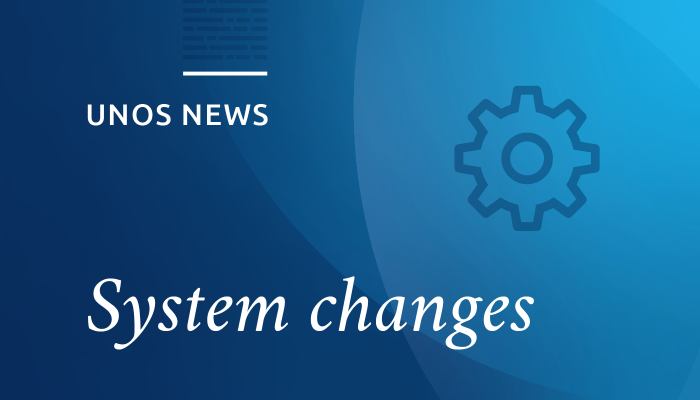Audience
- Primary Transplant Program Administrators, Primary Transplant Data Coordinators and Primary Physicians
- TX Program Administrators/Managers, Data Coordinators, TX Program – Clinical Coordinators
- Primary OPO Administrative Directors
- All UNet℠ users
- Please share this notice with anyone in your organization who would benefit from this information.
Implementation dates:
- Dec. 3: Heart, lung, heart-lung, liver and intestine
- Dec. 15: Kidney, pancreas, kidney-pancreas and pancreas islets
At-a-glance
Changes will be made to how local donor acceptance criteria in Waitlist℠ are used for matching potential recipients to donated organs in order to provide additional efficiency in organ allocation. Transplant programs should evaluate their current settings.
Background
For certain donor acceptance criteria, the Waitlist application allows users to use distinct screening criteria for “local” compared to “import”. For example, a candidate might accept a death after circulatory death (DCD) donor if the offer is local, but choose to be screened from a match anytime the offer is an import (or non-local) offer. The system currently uses the term local to mean offers from donors within the same donation service area (DSA). As allocation policies transition away from the use of DSA and OPTN region, the term “local offer” is taking on new meaning.
A new framework has been developed to determine what type of offers would be screened using “local” acceptance criteria for a candidate. Because proximity to the donor hospital is a primary factor in the revised allocations, the location of the donor hospital in comparison to the candidate will be considered when “local” acceptance criteria are applied.
After implementation, local acceptance criteria will be used to include candidates on a match run when the candidate’s location is as outlined below:
- Offers to candidates listed at transplant programs within the DSA and/or within 250 NM of the donor hospital:
- Heart (Implementing Dec. 3)
- Heart-lung (Implementing Dec. 3)
- Lung (Implementing Dec. 3)
- Kidney (implementing Dec. 15)
- Pancreas (implementing Dec. 15)
- Kidney-pancreas (implementing Dec. 15)
- Pancreas islets (implementing Dec. 15)
- Offers to candidates listed at transplant programs within the DSA and/or within 150 NM of the donor hospital:
- Liver (Implementing Dec. 3)
- Offers to candidates listed at transplant programs within the DSA and/or within 500 NM of the donor hospital”
- Intestine (Implementing Dec. 3)
This decision was made in response to community feedback. An Organ Procurement and Transplantation Network workgroup that included donation and transplant members with experience in all organ types collaborated to develop these changes.
The decision to maintain the use of DSA definitions for local acceptance criteria, in addition to distance, was made to ensure minimal disruption in organ allocation practices.
The inclusion of DSA in this definition does not impact the order of the match run as that is established and organized by distance-based allocation definitions within OPTN policy.
What you need to do
Transplant programs for all organ types should evaluate their current “local” acceptance criteria settings for candidates in Waitlist and determine if updates are appropriate based on the revised definition of “local” donor acceptance criteria.
If your program uses the listing defaults available for kidney, pancreas, kidney-pancreas or pancreas islets, you should review your programs settings for local acceptance criteria and make changes, if appropriate.
Additional resources
Find professional education on UNOS Connect:
- QLT103D Acceptance Criteria for Distance-based Allocation
In addition, DonorNet® online help documentation has been updated so that transplant programs will have access to the information about how local acceptance criteria is used for offers for all organ types.
Questions?
If you have questions relating to implementation, contact UNOS Customer Service at [email protected], or call 800-978-4334 from 8 am to 7 pm EST.
For policy-related questions, contact [email protected].
The Organ Center is available around the clock and can be reached at 800-292-9537.

